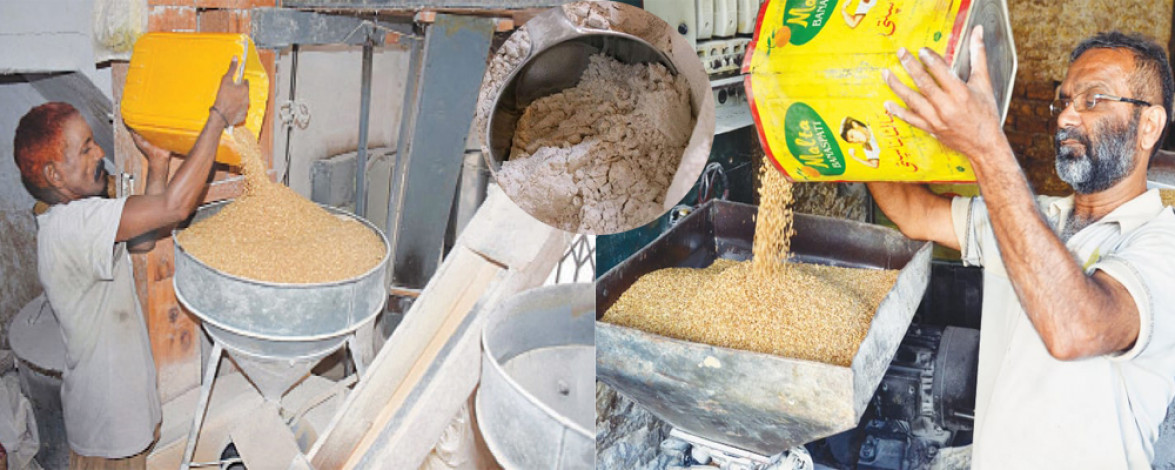
File Photo
It can be said that the work of the food department of Sindh
again went under the cloud. Distribution of wheat by section between roller
flour mills and chakkis owners was affected by the discrepancy, putting
consumers under an additional financial burden in these days of endless inflation.
The department in accordance with its policy allocates wheat
quota crops between flour mills and mills which puts the flour mills at a
disadvantage. Flour mills receive a large share of wheat. Ata Chakkis is
dependent on small and medium-sized businesses and departments for wheat. They
complain that due to insufficient quotas, the food department is forced to
procure grain from the market to meet their demand.
This brings questions of food security and consumers’
economic cost into the limelight since wheat is a staple food. The rural
population has always consumed flour produced by chakkis, but over the years,
the trend of consuming chakki-produced flour has substantially increased in the
urban areas since health experts assert it has fibre and less sugar and
carbohydrate content that benefits health.
Chakkis exist in rural and urban areas and sell smaller
quantities of flour to consumers. Flour mills supply in bulk, given their
commercial stakes across the province. Consumers’ incomes are not increasing
proportionately if rising inflation is to be considered.
The food department’s wheat allocation policy puts them
under an economic burden as they buy expensive flour from chakkis, leaving them
high and dry. “Food department must listen to chakki owners’ concern,” said
Hyderabad Chamber of Commerce and Industry president Adeel Siddiqui.
According to Sindh Abadgar Board (SAB) vice president,
chakki businesses should not be discouraged. “Demand for chakki’s flour is
increasing as everyone values the importance of whole wheat for its
ingredients. But inadequate wheat supplies increase flour prices, undermining
the food security of poor consumers,” he contended. He said chakkis serve
consumers at the grass-root level for one-two kg of flour, which mills don’t.
“Food department’s performance has never been satisfactory
and it remains least concerned about these issues. I fail to understand why the
food department doesn’t begin the release of wheat even in June. Why hasn’t the
department increased its storage of wheat stocks instead of leaving it exposed
to contamination? This showed how efficiently it deals with this strategic
crop that also falls in the domain of the Ministry of Food Security and
Research,” he remarked.
The district administrations fix the price per kg of flour,
but chakkis find it difficult to keep flour supplies going as per the official
rate given the procurement price of wheat from the market and overhead costs of
flour production.
Inflation-ridden consumers, including the elderly, line up
to buy subsidised flour from fixed points whose numbers remain insufficient.
Instead, the exercise remains merely cosmetic. In the case of Hyderabad, the
administration had fixed a price of flour in March and since then no official
price of flour was fixed, inviting ire from chakki owners who had been
protesting against it.
They were questioning the posting of the food official in
Hyderabad, where chakki flour price was fixed only in March at Rs72 per kilo
retail. Since then, the administration avoided setting it due to the ongoing
row between the food department and chakki owners. Sindh food secretary Raja
Khurram didn’t respond to Dawn’s queries when contacted.
The food department, which was hit by back-to-back
multimillion rupees corruption cases, couldn’t bring a policy shift in
quota-based wheat supplies for chakkis and flour mills. Food officials having
tainted backgrounds were posted in violation of the Supreme Court’s directives.
Why the Sindh government has avoided making wheat procurement and distribution
transparent is anybody’s guess.
The food department handles a single wheat crop 365 days
every year, and that too was hit by financial embezzlement and anomalies, which
is documented. Owing to the insensitivity of the provincial food department,
adulteration and contamination of wheat in godowns have become a norm.
The department procures only a specific quantum of wheat
Sindh produces. For the last few years, even that quantum was not procured due
to favouritism and money minting by those at the helm. The department could not
achieve the target of 1.4 million tonnes of procurement in the current season
despite the fact procurement, for the first time, started in March this year.
According to chakki owners, consumers in Hyderabad, the
largest urban centre after Karachi, faced the dilemma of buying expensive flour
because no rate for flour has been fixed yet.
“We mostly depend on procurement of wheat from the open
market, and that obviously remains expensive. Its financial impact in terms of
overhead cost in the production of flour out of per kilo of wheat is
transferred to consumers,” said Haji Mohammad Memon, president of Chakki Owners
Welfare Association.
Sindh food department procured wheat in the 2021-22 season
for a support price of Rs5,500 per 100kg bag from farmers. Wheat was supplied
to chakki owners for Rs5,825 per 100kg (Rs58.25 per kilo) in Oct and Nov 2022.
However, open market wheat’s price stood at Rs86 per kg or Rs8,600 per 100kg
bag till Nov 3, indicating a substantial difference in wheat’s price.
The available inadequate wheat stocks from Hyderabad’s
godowns were being depleted. It was feared wheat supply for chakkis in days to
come would become difficult, leaving them at the mercy of the market.
More here.
Source:
Online/SZK
Comment Now